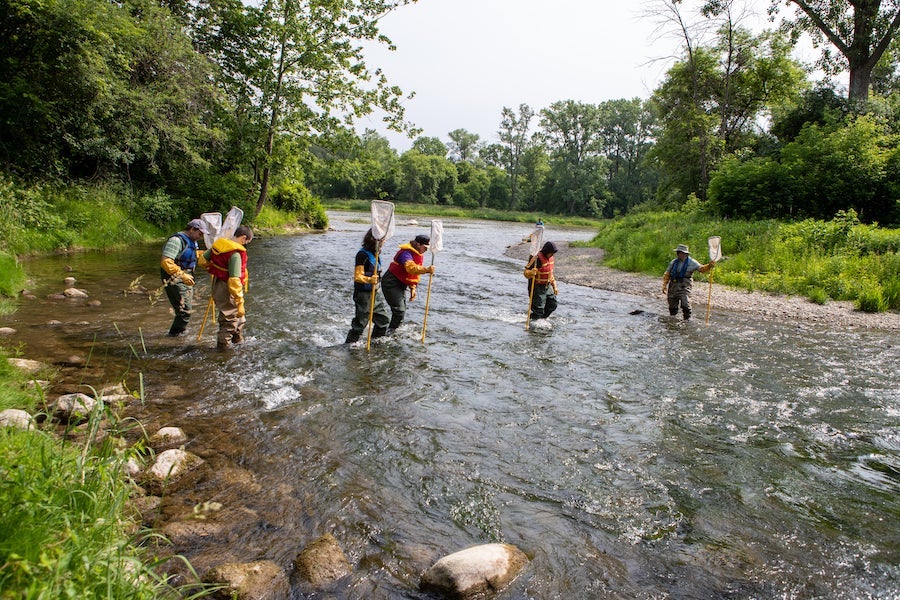Editor:
Brandon Sweet
University Communications
bulletin@uwaterloo.ca
Black Graduate Archive wins 2022 Equity and Inclusivity Award
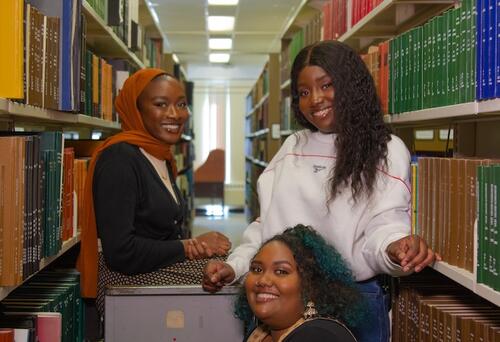
The creators of the Black Graduate Archive are Safyya Cissé (back left), Joy Adeyemi (back right), and Ola Idris Ali (front).
This article was originally published on the Faculty Association website.
Inaugurated in 2012 by the Faculty Association’s Equity Committee (then the Status of Women & Equity Committee, or "SWEC"), the Equity & Inclusivity Award recognizes a group, member, or affiliate of the University of Waterloo community whose actions have demonstrated an exemplary commitment to improving equity, inclusivity, and/or diversity at the University of Waterloo. The award has recently shifted to emphasize supporting continued equity work, rather than providing a reward for past work.
The Black Graduate Archive (BGA) is a perfect example of an initiative that will advance Equity and Inclusivity through a specific project, and this year's award will fund this future work, in part.
The BGA is a new group on campus that was formed to complete a singular purpose—to create a photo archive of Black undergraduate students who managed to graduate despite the difficulties of studying during the pandemic. Though the BGA does not have its own history of equity work on campus, the three students who are a part of this group— Ola Idris Ali, Joy Adeyemi, and Safyya Cissé—are all equity champions in their own way.
Ola, Safyya, and Joy are all past presidents of student organizations—Ola is a past president of the UW Black Association for Student Expression (UW BASE), and both Safyya and Joy are former presidents of the African Student Associate (UWASA)—where they conceptualized and executed several projects designed to foster an environment of belonging for Black students on campus. Most notably, they’ve played instrumental roles in organizing and participating in “Traces” the annual talent showcase for Black students, put on by UWASA, which returned this year. They have also partnered with other equity-seeking groups on campus, such as the Black Faculty Collective and other student groups, to bring awareness and action to issues affecting Black and other racialized students on campus, and were instrumental in creating spaces for dialogue during the George Floyd protests of 2020.
The BGA project in a way serves as a parting “love letter” from these three phenomenal students who want to highlight the hard work of their peers who managed to make it to graduation during the hardest two years for any student at the university level. It is their way of saying: we were here and we made it; you can too.
The Equity Committee of FAUW recognizes and appreciates the work of these students, and hopes that the award can help support this important project.
The Black Graduate Archive is expected to be completed and ready to share in August 2022.
Copyright at Waterloo launches website redesign
This article was originally published on the Copyright at Waterloo website.
Our website has been redesigned to make it easier to use. The Copyright Advisory Committee welcomes your feedback; please fill out the website feedback form or reach out to Lauren Byl, copyright & licensing librarian with your thoughts.
Content has been arranged into three streams:
- Copyright for teaching
- the information you need to make decisions about using material in either in-person or online/remote classrooms.
- Copyright for publishing
- guidance on how the Copyright Act, Policy 73: Intellectual Property, grant funding requirements, and publisher rules and practices impact your ownership and reuse of your own work.
- Copyright for your thesis
- guidance on reuse of content in your thesis, from your own published work to third-party materials
We’ve also updated our Frequently Asked Questions page so it can be sorted by audience and category.
Printing with wet clay

This article was originally published on Waterloo News.
The reception area of a high-rise office in downtown Toronto now features a one-of-a-kind privacy wall thanks to a research team from the Waterloo School of Architecture.
Comprised of 175 unique, interlocking bricks made of clay, the Hive project combined an ancient building material with modern digital design and 3D printing technologies.
“This approach embraces the spirit of traditional ceramic craft with robotic precision, offering new avenues for material expression and geometric complexity within this field,” team members wrote in a project description.
The showpiece at the 24th-floor offices of Investment Management Corporation of Ontario at 16 York Street was developed after SDI Interior Design approached the architecture school.
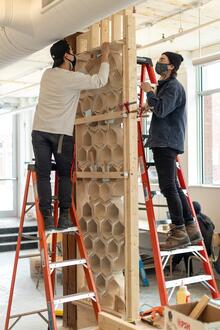 Professor David Correa and his students have been working with clay since acquiring a 3D printer capable of making large-scale objects with it in 2018.
Professor David Correa and his students have been working with clay since acquiring a 3D printer capable of making large-scale objects with it in 2018.
The honeycomb wall features variations in light and privacy as the apertures of its bricks – each one of them unique – gradually open and close.
"It was a great applied research experience," Correa said. "We were super thrilled when it all came together, and it worked out - even better than expected.”
Fabricating the wall required an iterative process using both digital and physical models, as well as the formulation of special clay mixes and multiple assembly mock-ups.
“While the messy and unstable nature of wet clay presents technical challenges in practical applications, these same qualities create opportunities to explore the unique aesthetic and functional possibilities offered by this fabrication process,” the team wrote.
In addition to Correa, the design and development team included alumni Ye Sul E. Cho, Ji Shi and Meghan Taylor, and graduate researchers James Clarke-Hicks and Isabel Ochoa.
Environment researcher Martine August receives Early Researcher Award in Planning
This article was orignally featured on Faculty of Environment's website.
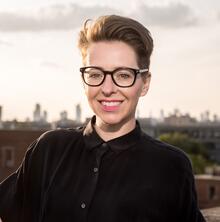 Martine August, a professor of Planning in the Faculty of Environment at the University of Waterloo was recently granted the Early Researcher Award to help further her research on the impacts of housing financialization and its role in Canada’s housing crisis.
Martine August, a professor of Planning in the Faculty of Environment at the University of Waterloo was recently granted the Early Researcher Award to help further her research on the impacts of housing financialization and its role in Canada’s housing crisis.
August, along with other eight University of Waterloo researchers, Early Research Award winners received a grant worth $1.12 million. The program, publicly funded through the Government of Ontario, aids recently appointed researchers to build their research teams.
August’s research explains the financialization of multifamily rentals and how real estate investment trusts (REITs) have grown to own 10 per cent of apartments in Canada. She and other researchers will receive $140,000 over five years plus an additional $50,000 from the University.
“I argue that neoliberal restructuring, government policy, and financial innovations created conditions for profitable reinvestment,” said August. “In each suite, tenants are exposed to the logics of finance capital, where ‘repositioning’ strategies generate profits via displacing existing tenants and treating housing like any other market good, rather than a human right.”
The selection process for this award includes criteria such as the excellence of the researcher, quality of the proposal, development of research talent and the benefits this research will bring to Ontario.
To learn more about this award visit Government of Ontario.
Researchers and Indigenous students learn about Grand River
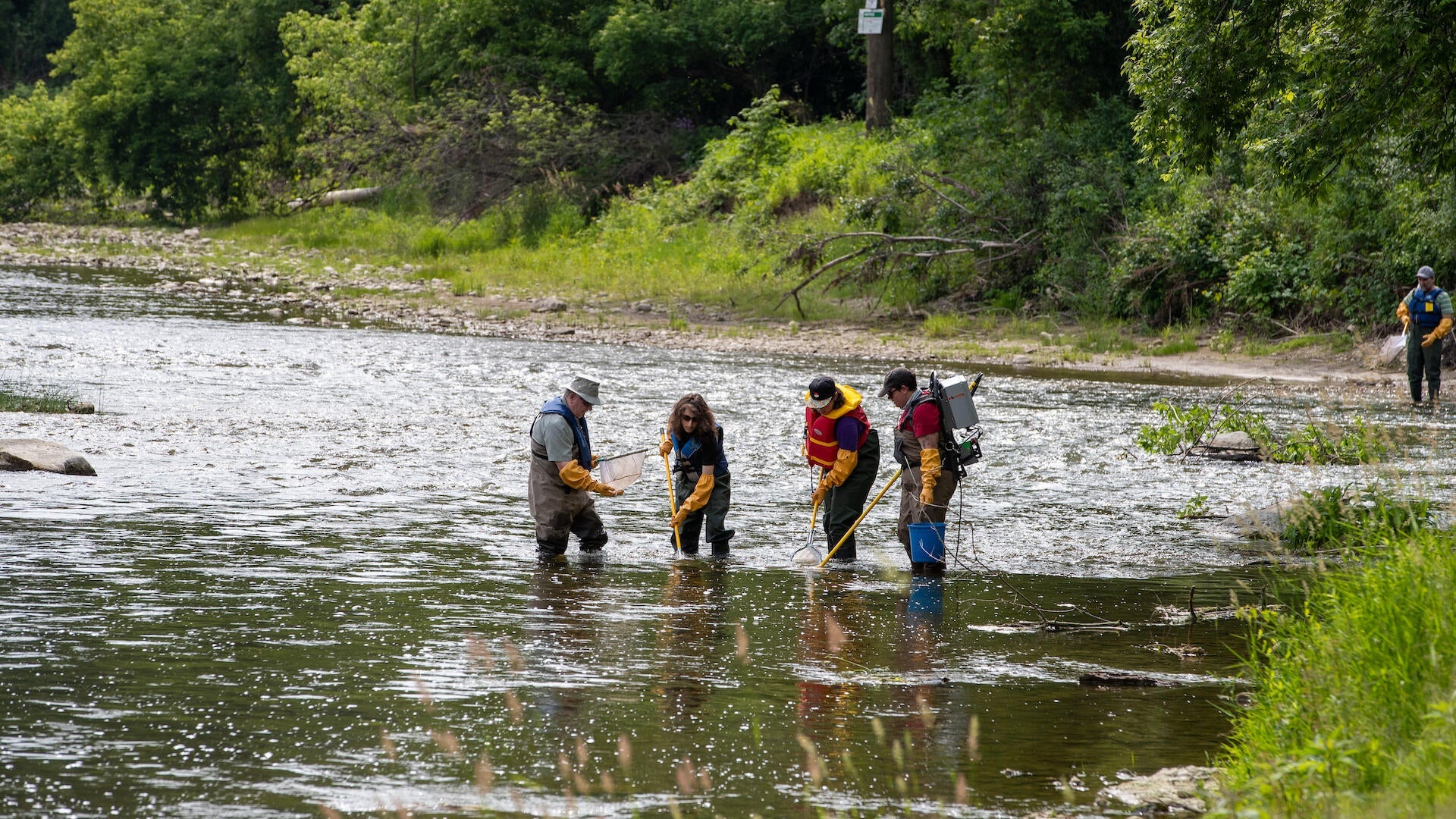
This article was originally published on Waterloo News.
On June 15, grade nine students from Six Nations Polytechnic (SNP) and the STEAM Academy program donned their waders to join researchers Charles de Lannoy, Karen Kidd and Waterloo Biology Professor Mark Servos to conduct experiments in the Grand River.
In its first year, this joint initiative led by McMaster University and the University of Waterloo, is a land-based experiential learning approach to science and engineering. The event is a pilot for a micro-credential course in which the students could eventually gain a McMaster University credit by the end of high school.
Electrofishing with Mark Servos
Decked out in their safety equipment, students waited to catch fish with nets after emitting a small electric shock to the water. Once they caught a few, they brought them back to land and put them in a clear tank. Here they learned about how to identify each fish, from where their fins were located to the markings on their bodies.
“Experiential learning is one of the most effective ways to engage with students and people in general,” said Servos, who is also the Canada Research Chair in Water Quality Protection. “It is easy to get excited about aquatic science when you are knee-deep in a river.
“This experience allows us to have a conversation and truly communicate with each other," Servos said. "I learned a lot from the students. They are so enthusiastic and engaged.”
Engineering and science in action
“It’s a very exciting opportunity to see engineering and science in action, and it's also fun to just go into the river, cool off on a hot day, explore what these two rivers look like, discover what makes them different, and use technologies and an understanding of ecology to evaluate their health,” said de Lannoy, chemical engineering associate professor at McMaster and one of the lead organizers of the initiative.
Before beginning their work, a student laid tobacco in the water.
“We wanted to establish some protocol before conducting our investigations and environmental work,” said Chris Martin, Indigenous Program Facilitator at SNP. “Placing the tobacco in the river acknowledges where we are and lets creation know what we are about to do. It allows us to bring our minds together before the event.”
Throughout the day, students cycled through three activities.
Water Quality Monitoring and Sensors with Charles de Lannoy
de Lannoy focuses on developing technologies that can continuously monitor the health of the river remotely and make those technologies robust, adaptable and cheaper.
Students were able to use these sensors to test the oxygen in various parts of the river to determine its health. One student remarked how the sensors were like little tentacles. de Lannoy was thrilled with the curiosity of the students, how they asked great questions and devised creative hypotheses.
de Lannoy is proud of what they have accomplished with the STEAM Academy.
“What we're showcasing is that engineers and scientists can engage with First Nations Youth and they can have really meaningful experiences,” said de Lannoy. “We can really serve this community and I encourage other professors to do more activities like this.”
Bug Collection and Identification with Karen Kidd
Using nets and tweezers, students learned about bugs in the water. While exploring the river, they studied the habitat of insects and critters. Karen Kidd’s favourite thing is to see what’s living under rocks. After scooping up some samples, they perused the samples with tweezers, picking out insect larvae, crayfish, leeches, worms and more.
“It is my impression that high school students don’t get a lot of exposure to environmental sciences, especially hands-on experiences like this one,” said Kidd, School of Earth, Environment & Society professor at McMaster. “I hope they gained a better understanding of some of the challenges our waterways face, and that it will motivate some of them to pursue careers in environmental sciences.”
Kidd, de Lannoy and Servos are part of a research program funded by Global Water Futures called “Co-Creation of Indigenous Water Quality Tools,” led by Dawn Martin-Hill at McMaster.
“With members of Six Nations, we are assessing the health of their waters, fish and wildlife. This was another great opportunity for us to share what we are doing on the Grand River, and to teach them some of the tools we use to understand how humans are affecting our aquatic ecosystems. If it instilled in them a better appreciation of our environment and the need to protect it, then I consider that a win.”
Adriana Johnson, Grade 9 student at SNP, was inspired by the learning and experiences. She has always wanted to get into engineering, and now she wants to focus on doing something involving the environment.
“I remember when you couldn't even see through the water and it was so polluted, and to see now there's like so much life and it's becoming closer to what it was before colonization pollution,” she said. “It makes me want to put more effort into reviving it really.”
Joshua George, another grade 9 student, was surprised by the amount of biodiversity in the water.
“They talked about the amount of mussel species that were in the water and I found it quite interesting,” said George.
Following the field day, students used lab equipment to analyze samples collected from the river at the STEAM Academy in Brantford. Researchers had the opportunity to showcase new sensors they are developing, water testing equipment they frequently use, and digital microscopes to demonstrate fish and invertebrates’ analysis techniques.
“I am sure I learned just as much from the students as they learned from me, added Kidd. “And it was a blast.”
Link of the day
When and Where to get support
Students can visit the Student Success Office online for supports including academic development, international student resources, immigration consulting, leadership development, exchange and study abroad, and opportunities to get involved.
Instructors looking for targeted support for developing online components for blended learning courses, transitioning remote to fully online courses, revising current online courses, and more please visit Agile Development | Centre for Extended Learning | University of Waterloo (uwaterloo.ca).
Instructors can visit the Keep Learning website to get support on adapting their teaching and learning plans for an online environment.
Course templates are available within your course in LEARN to help you build and edit your content and assignment pages quickly.
The following workshops, webinars, and events are offered by the KL team (CTE, CEL, ITMS, LIB):
-
Scholarship of Teaching and Learning (SoTL) Methods – self-directed, continuous self-enrollment course in LEARN.
-
Independent Blended Course Design (iBlend) - self-directed, continuous self-enrollment course in LEARN.
-
Copyright Overview for Waterloo Instructors and Staff - self-directed, continuous self-enrollment course in LEARN.
-
Independent Remote Course Design Essentials (iReCoDE) - self-directed, continuous self-enrollment course in LEARN.
-
Supporting Student Mental Health (for Instructors) – self-directed, continuous self-enrollment course in LEARN.
-
SoTL Stories, Wednesday, June 15, 1:00 p.m. to 2:00 p.m.
-
Research & Reconciliation: Unsettling Ways of Knowing Through Indigenous Relationships: A Learning Circle Series (CTE7013), Thursday, June 16, 1:00 p.m.
Supports are available for employees returning to campus. Visit IST’s Hybrid Work and Technology guidelines and workplace protocols to assist with the transition.
The Writing and Communication Centre has in-person and virtual services to support grad and undergrad students, postdocs and faculty with any writing or communication project. Services include one-to-one appointments, drop-ins at Dana Porter Library, online workshops, writing groups, English conversation practice, and custom in-class workshops.
Co-op students can get help finding a job and find supports to successfully work remotely, develop new skills, access wellness and career information, and contact a co-op or career advisor.
The Centre for Career Action (CCA) has services and programs to support undergrads, grad students, postdocs, alumni, and employees in figuring out what they value, what they’re good at, and how to access meaningful work, co-op, volunteer, or graduate/professional school opportunities. Questions about CCA's services? Live chat, call 519-888-4047, or stop by our front desk in the Tatham Centre 8:30 a.m. to 4:30 p.m., Monday to Friday.
Drop-in to Warrior Virtual Study Halls on Wednesdays from 5:30 p.m. to 7:00 p.m. Come together in this virtual space to set goals and work independently or in groups each week.
Renison's English Language Institute continues to offer virtual events and workshops to help students practice their English language skills.
If you feel overwhelmed or anxious and need to talk to somebody, please contact the University’s Campus Wellness services, either Health Services or Counselling Services. You can also contact the University's Centre for Mental Health Research and Treatment. Good2Talk is a post-secondary student helpline available to all students.
The Library is open with expanded hours for access to book stacks, drop-in individual study space, bookable group study rooms, drop-in access to computers and printers, book pick-up services and IST Help Desk support. Librarian consultations, Special Collections & Archives and the Geospatial Centre are available by appointment. Full details on current services and hours are available on the Library’s COVID-19 Update webpage.
The Faculty Association of the University of Waterloo (FAUW) continues to advocate for its members. Check out the FAUW blog for more information.
The University of Waterloo Staff Association (UWSA) continues to advocate for its members. Check out the UWSA blog for more information.
The Sexual Violence Prevention and Response Office (SVPRO) supports all members of the University of Waterloo campus community who have experienced, or been impacted, by sexual violence. This includes all students, staff, faculty and visitors on the main campus, the satellite campuses, and at the affiliated and federated Waterloo Institutes and Colleges. For support, email: svpro@uwaterloo.ca or visit the SVPRO website.
The Office of Indigenous Relations is a central hub that provides guidance, support, and resources to all Indigenous and non-Indigenous campus community members and oversees the University's Indigenization strategy.
The Waterloo Indigenous Student Centre, based at St. Paul’s University College, provides support and resources for Indigenous students, and educational outreach programs for the broader community, including lectures, and events.
WUSA supports for students:
Peer support - MATES, Glow Centre, RAISE, Women’s Centre - Visit https://wusa.ca/services/wusa-peer-support to book an appointment either in person or online for the Fall term.
Food Support Service food hampers are currently available from the Turnkey Desk 24/7 in the Student Life Centre. Drop off locations are also open again in SLC, DC, DP, SCH and all residences.
Co-op Connection all available online. Check https://wusa.ca for more details.
Centre for Academic Policy Support - CAPS is here to assist Waterloo undergraduates throughout their experience in navigating academic policy in the instances of filing petitions, grievances and appeals. Please contact them at caps@wusa.ca. More information is available.
WUSA Student Legal Protection Program - Seeking legal counsel can be intimidating, especially if it’s your first time facing a legal issue. The legal assistance helpline provides quick access to legal advice in any area of law, including criminal. Just call 1-833-202-4571.
Empower Me is a confidential mental health and wellness service that connects students with qualified counsellors 24/7. They can be reached at 1-833-628-5589.
GSA-UW supports for graduate students:
The Graduate Student Association (GSA-UW) supports students’ academic and social experience and promotes their well-being.
Advising and Support - The GSA advises graduate students experiencing challenges and can help with navigating university policies & filing a grievance, appeal, or petition.
Mental Health covered by the Health Plan - The GSA Health Plan now has an 80 per cent coverage rate (up to $800/year) for Mental Health Practitioners. Your plan includes coverage for psychologists, registered social workers, psychotherapists, and clinical counselors.
Dental Care - The GSA Dental Plan covers 60 to 70 per cent of your dental costs and by visiting dental professionals who are members of the Studentcare Networks, you can receive an additional 20 to 30 per cent coverage.
Student Legal Protection Program - Your GSA fees give you access to unlimited legal advice, accessible via a toll-free helpline: +1-833-202-4571. This advice covers topics including housing disputes, employment disputes, and disputes with an academic institution.
The Graduate House: Open Monday to Tuesday 11:30 a.m. to 7:00 p.m. and Wednesday to Friday 11:30 a.m. to 9:00 p.m. We’re open to all students, faculty, staff, and community members. The Graduate House is a community space run by the GSA-UW. We’re adding new items to the menu. Graduate students who paid their fees can get discounts and free coffee.
When and Where (but mostly when)
Warriors vs. Laurier Blood Donation Battle. Join our “Waterloo Warriors” team on the Blood.ca website or app. #ItsInYouToGive
Warriors Custom Apparel Program June 22 – July 13. Purchase customized team specific gear to get ready for the 2022-2023 season. Hoodies, Hats, Jerseys, T-shirts and more. Buy now!
W Store's Spend More Save More Event, 10:00 a.m. - 4:00 p.m. Tuesday, June 28 and Wednesday, June 29
Entrepreneurial Ph.D. Fellowship Information Session Wednesday, June 29, 12 noon to 1:00 p.m., Conrad School or Zoom. Registration required.
Warriors Youth Summer Day Camps, July 4 to September 2. Open to boys and girls age 5-18. Baseball, Basketball, Football, Hockey, Multi-Sport and Games & Volleyball. Register today.
Valuation of water quality in Canada: An overview of the upcoming policy needs and challenges, presented by Jean-Michel Larivière, Environment and Climate Change Canada. Part of the Water Institute's webinar series: The Value of Water in Canada. Wednesday, July 6, 12:00 p.m.
WaterTalk - Nature Water: A journal for all water-related research, presented by Fabio Pulizzi. Thursday, July 7, 10:00 a.m.
Positions available
On this week's list from the human resources department, viewable on the UWaterloo Talent Acquisition System (iCIMS):
- Job # 2022-8651: Senior Investigation Specialist, Conflict Management & Human Rights Office, USG 10
- Job # 2022-8766: Human Resources Partner, Human Resources, USG 8 - 11
- Job # 2022-8689: Information Systems Developer, Centre for Education in Mathematics and Computing, USG 7 - 11
- Job # 2022-8717: Administrative Assistant to the Chair, Applied Mathematics, USG 5 - 5
- Job # 2022-8721: General Manager, Graduate Student Association, USG 9
- Job # 2022-8520: Manager, Centre for Career Action, CEE - Centre for Career Action, USG 12
- Job # 2022-8655: Data and Information Analyst - Undergraduate Studies, Science - Undergraduate Office, USG 10
- Job # 2022-8684: Communications Specialist, Co-operative and Experiential Education Business Services, USG 9
- Job # 2022-8731: Information Systems Specialist (Full Stack Software Developer), IST, USG 9 - 11
- Job # 2022-8769: Administrative Assistant, School of Pharmacy, USG 6
- Job # 2021-7579: Program Management Specialist, WatSPEED, USG 10 - 11
- Job # 2022-8676: Administrative Manager, Religious Studies, USG 6
- Job # 2022-8719: Support Services Coordinator, Sociology and Legal Studies, USG 5
- Job # 2022-8730: Digital Media Manager, Stratford School, USG 10
- Job # 2022-8775: Administrative Coordinator and Advisor, Undergraduate Studies, Communication Arts, USG 6
- Job # 2022-8674: Administrative Officer, Chemical Engineering, USG 11
- Job # 2022-8767: Facility Manager – Centre for Advanced Photovoltaic and Display Systems (CAPDS) Electrical and Computer Engineering, USG 10
- Job # 2022-8727: Chef, Food Services, USG 7
- 2022-8732: Employee Relations & Administrative Assistant, Food Services, USG 6
Secondments/Internal temporary appointments
- Job # 2022-8680: Network Technician, IST, USG 7 - 9
- Job # 2022-8751: Academic Advisor, Science Undergraduate Office, USG 8
- Job # 2022-8682: Admissions Officer, Office of the Registrar, USG 8 - 9
- Job # 2022-8729: Administrative Officer, Stratford School, USG 11
- Job # 2022-8774 : Admissions Coordinator, Admissions- Registrar's Office, USG 5
- Job # 2022-8758: Research Ethics Advisor, Office of Research Ethics, USG 9
